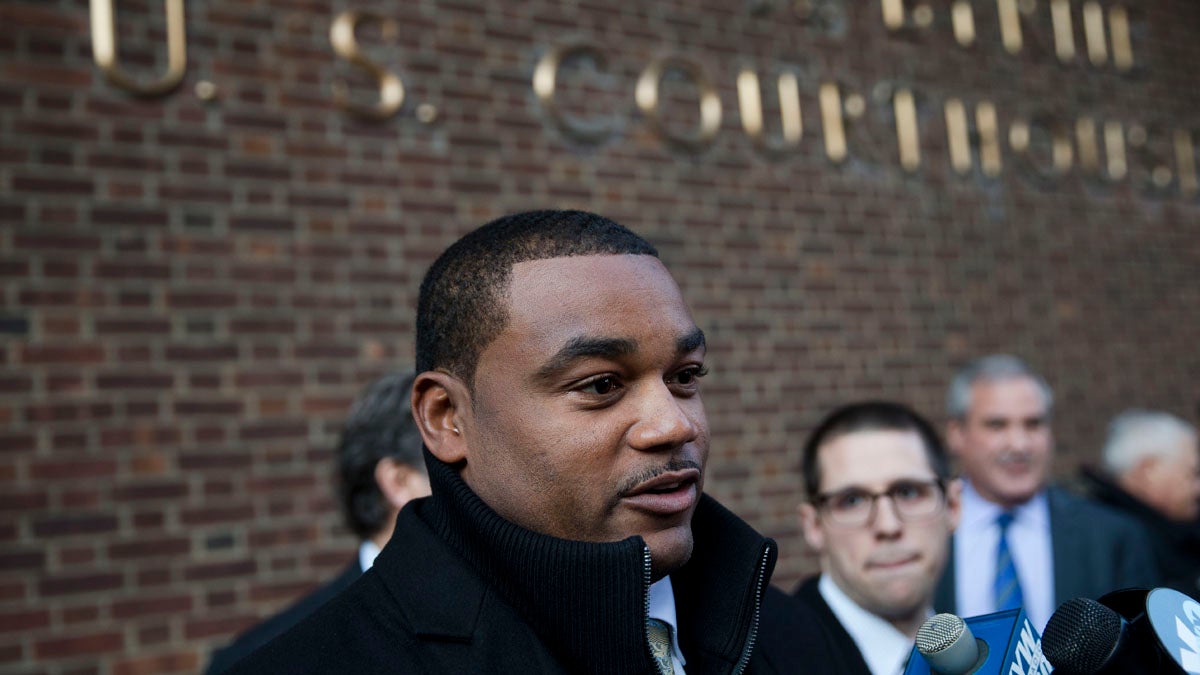Fairness of NFL concussion settlement debated in federal court in Philadelphia
Listen
Former NFL player Shawn Wooden speak with members of the media after a hearing on the proposed NFL concussion settlement Wednesday outside of the U.S. Courthouse in Philadelphia. (AP Photo/Matt Rourke)
The Philadelphia judge handling the proposed settlement between the NFL and retired players with brain injuries held a hearing in federal court to evaluate its fairness.
The Wednesday hearing comes 11 months after U.S. District Judge Anita Brody rejected the NFL’s offer of $675 million because it was unclear the sum would last 65 years. When the league agreed to remove the cap on those funds, she granted preliminary approval in July.
The parties returned to court with the plaintiffs and the NFL on the same side. Both declared the settlement “historic,” and said it offered timely compensation without players having to prove NFL games caused their impairment. They repeatedly pointed to the high participation rate of players in the deal as evidence of its fairness. As of the hearing, just 199, or less than 1 percent, of players had opted out.
Those opposed to the settlement said they are concerned about the limited number of qualifying conditions — currently restricted to ALS, Parkinson’s, Alzheimer’s, and two levels of dementia — and award reductions with increasing age. The maximum amount for a single player is $5 million.
They also balked at the $75 million cap still on the assessment program the NFL is setting up to help screen players for potential problems.
Steven Molo, an attorney for the opponents, was incredulous at how a deal could be brokered without fully compensating chronic traumatic encephalopathy, or CTE, which he noted had up until the settlement agreement been described on the plantiffs’ counsel’s own website as “the most serious and harmful disease that results from the NFL and concussions.”
CTE can only be diagnosed upon death with an autopsy. The settlement includes up to $4 million in compensation for those with CTE if they died before July 7 of this year. But, as Molo emphasized, that award is reduced to nothing if a player were to die just a day later.
The NFL and the class-action settlement counsel argued that CTE is covered because it can manifest as dementia, usually in its later stages.
“There is certainly a ‘have their cake and eat it, too’ aroma to these objections,” said Brad Karp, a lawyer representing the NFL.
Brain injury attorney Michael Kaplen, who wasn’t involved in the settlement but attended the hearing, said that players with CTE that doesn’t progress to later stages — which may be a majority — would be left out in the cold.
“They will plateau in this earlier condition of emotional roller-coaster, just going downhill, and that’s where they will stay. Until, unfortunately, many kill themselves,” said Kaplen. “Those players will never get a dime out of the settlement.”
But for those who are already injured, time is critical. Former NFL player Shawn Wooden, who currently exhibits some symptoms but is not yet eligible for compensation, said the deal could be a reassurance.
“It could just give guys like myself peace of mind,” he said. “Also, you know, the guys that definitely need the help right now could use it.”
Other players and their families have chosen to opt out. Dione Smith, whose father, John Wilbur, developed CTE and would have qualified for an award, thinks she may be able to do better.
Her attorney, Gary Galiher, said that the league should not have such stringent requirements.
“John Wilbur couldn’t dress himself, and he wouldn’t have had a diagnosis by their criteria — he wasn’t dead yet,” he said.
Intern Katya Botwinick contributed to this report.
WHYY is your source for fact-based, in-depth journalism and information. As a nonprofit organization, we rely on financial support from readers like you. Please give today.

